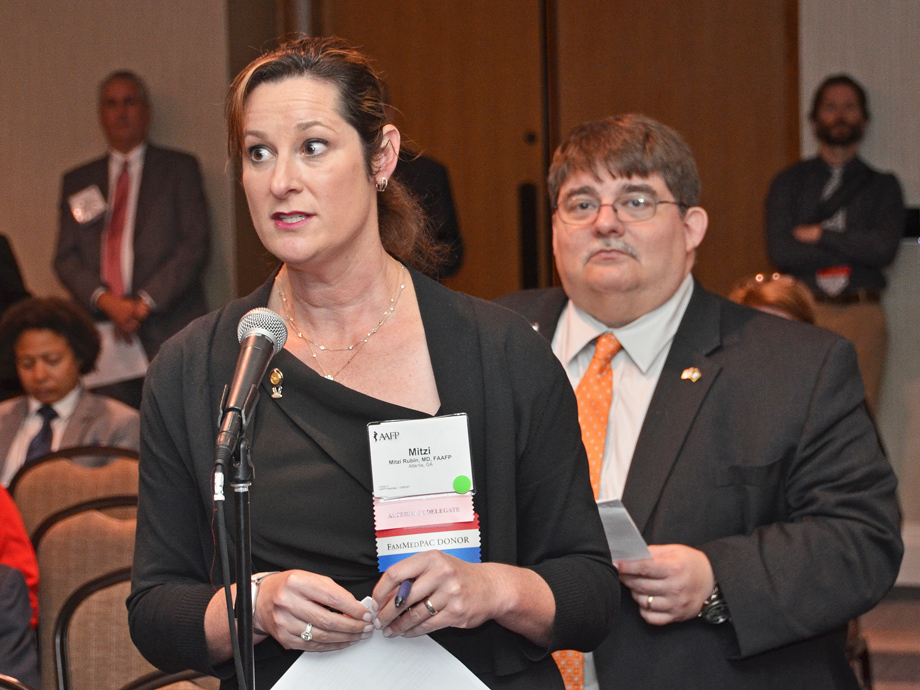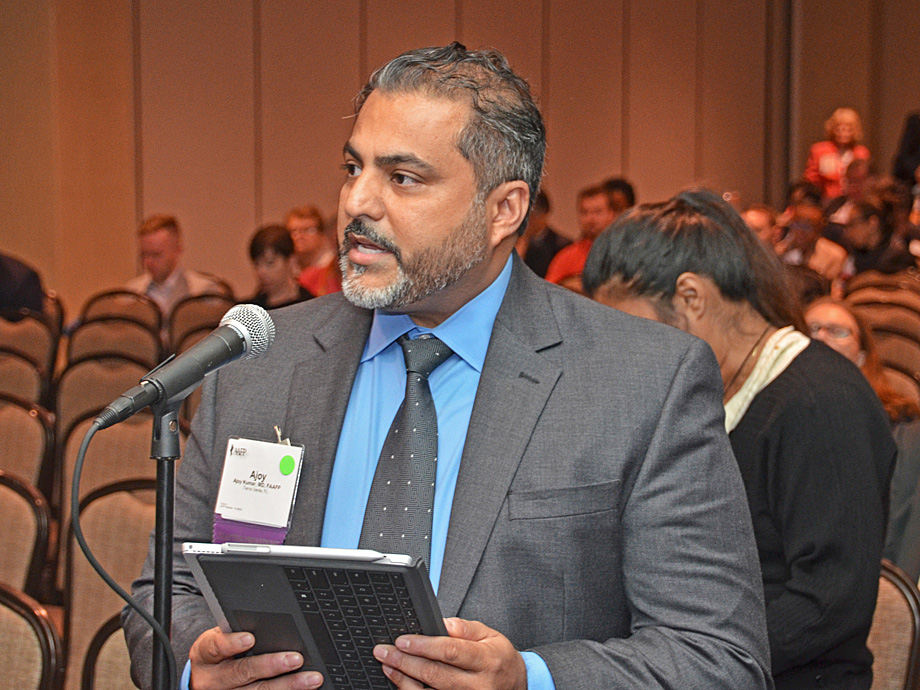2018 Congress of Delegates
Delegates Tackle Rural OB Decline, Hospitality Event
October 16, 2018, 02:41 pm Chris Crawford New Orleans – Delegates to the 2018 Congress of Delegates here addressed a number of issues, including the loss of obstetrical services in rural areas and the COD's candidate hospitality event.
Loss of Rural Obstetrical Services
Family physicians who participated in the Reference Committee on Organization and Finance hearing here on Oct. 8 discussed a proposal that the AAFP work with the National Rural Health Association (NRHA), the American College of Obstetricians and Gynecologists (ACOG), and other engaged groups to address the growing loss of rural obstetrical services.
The resolution, sponsored by the Wisconsin and Texas chapters, highlighted CDC data that found the maternal mortality rate in large central metropolitan areas was 18.2 per 100,000 live births in 2015, but in the most rural areas, it was much higher at 29.4 per 100,000 live births.
Rural hospitals are closing their obstetrical units at an alarming rate, the authors said, citing recent research that found more than 50 percent of rural counties in the United States no longer provide hospital obstetrical care.

Georgia AFP alternate delegate Mitzi Rubin, M.D., of Atlanta, testifies during the 2018 Congress of Delegates that more than 30 hospital labor-and-delivery units in Georgia closed between 1994 and 2015.
The resolution, sponsored by the Wisconsin and Texas chapters, highlighted CDC data that found the maternal mortality rate in large central metropolitan areas was 18.2 per 100,000 live births in 2015, but in the most rural areas, it was much higher at 29.4 per 100,000 live births.
Rural hospitals are closing their obstetrical units at an alarming rate, the authors said, citing recent research that found more than 50 percent of rural counties in the United States no longer provide hospital obstetrical care.
Closure of rural obstetrical services results in increased travel burden for obstetrical patients and their families, the measure noted, and this has been shown to result in poorer outcomes.
Wisconsin AFP delegate Byron Crouse, M.D, of Sarona, acknowledged in his testimony that this issue doesn't have a simple fix.
"We are finding the complexity of this problem in Wisconsin and across the country," he said. "It's a hospital issue, it's a hospital staffing issue, it's a Medicaid reimbursement issue, it's a physician workforce issue, it's a burnout issue; the list goes on in terms of the complexity of issue included.
Story Highlights
"The AAFP should be the lead on this because our small, rural hospitals are staffed by family physicians. We should convene the health care associations like ACOG and others to address this complex problem."
Georgia AFP alternate delegate Mitzi Rubin, M.D., of Atlanta, said more than 30 hospital labor-and-delivery units in Georgia closed between 1994 and 2015.
"In fact, 79 of Georgia's 159 counties do not have a single obstetric provider," she said. "No family physician delivering, no midwife, no OB/Gyn."
Eight rural hospitals in Georgia have closed entirely since 2010, Rubin added.
"This is a crisis situation in the state of Georgia, and I know it is in most other states as well, so we support this resolution," she said.
General registrant Randy Rice, M.D, of Moose Lake, Minn., testified that he's been a family physician in rural Minnesota for more than 25 years, practicing obstetrics and performing caesarean births.
"I can tell you that this is something that's changing dramatically," he said, "and it is something that accounts for much of the increase in the maternal health indicators.
"We as family physicians provide excellent OB care in the rural setting."
Good-quality data indicate that if pregnant women are more than 30 minutes away from an obstetrical hospital, they are likely going to have poorer outcomes, Rice added.
"We need to get back to the foundations -- that we are training family physicians to be adequately able to provide maternal care in rural areas," he said.
To address all these concerns, the reference committee offered a substitute resolution that delegates adopted during the Oct. 9 business session. That measure recommended that the AAFP
- work with CMS to provide adequate Medicaid reimbursement for obstetrical services;
- work with the NRHA and the American Hospital Association to assist in providing educational and training opportunities to maintain hospital staff members' obstetrical knowledge and skills;
- work with the Society of Teachers of Family Medicine, the Association of Departments of Family Medicine and the Association of Family Medicine Residency Directors to assure basic and advanced obstetrical education is available to those who seek to provide obstetrical services;
- work with health systems and educational centers to support family physicians with advanced skills (such as performing cesarean sections) in low-volume settings, maintaining these skills through strategies such as spending time at high-volume centers, and participating in obstetrical care to maintain assessment and procedural competency; and
- work with ACOG and other policy groups to assure perinatal, obstetrical and neonatal policies focus on quality care in a manner sensitive to resources typical of a rural setting.

Florida AFP delegate Ajoy Kumar, M.D., of Tierra Verde , explains that the candidate hospitality event at Congress of Delegates can end up costing more than $20,000.
Candidate Hospitality Event
Another measure delegates adopted as amended called on the AAFP to re-examine how it handles the group hospitality event held for Board of Directors candidates during the COD. The overall intent of the resolution was to rein in costs borne by chapters by leveling the playing field with a cap on chapter spending.
The original resolution, which was sponsored by the California, Florida, Georgia, Kentucky, Massachusetts, Michigan, North Carolina, West Virginia and Wisconsin chapters, generated much discussion during the Oct. 8 reference committee hearing.
Florida AFP delegate Ajoy Kumar, M.D., of Tierra Verde, testified that a great deal of work and expense goes into running a candidate for the Board of Directors.
"This culminates in the hospitality event, which costs $2,500 minimum," he said. "Developing a campaign theme, decorations, giveaways, campaign-themed travels, etc., can easily exceed $20,000, which is not an insignificant amount for any chapter."
Kumar said the time alone required to conceptualize a campaign theme, booth design and hospitality activities can easily exceed 100 staff hours.
"We can achieve the hospitality event in a much more economical fashion that many can benefit from, and we can all go back to our members and tell them we truly are being better stewards of their resources," he said.
Resolution co-sponsor and Michigan AFP delegate David Walsworth, M.D., of East Lansing, explained that Michigan and a number of chapters think it's extremely important to limit the amount paid for these events for many reasons.
"Probably the most important one is considering what's being judged: a candidate's ability to communicate, where they stand on various issues and how you see yourself being represented by that individual," he said.
"We need to cut down on some of the extravagance, while holding on to the kernel of truth."
Other delegates spoke against the resolution, including New York State AFP delegate Marc Price, D.O., of Mechanicville, who said he agreed with the spirit of the resolution but not its specifics.
"When I go to the hospitality night, I see the candidates in their own element; I see them able to express their own personality, and I get to learn about them," he said. "I'm voting for someone who represents me.
"But I think this resolution is a little too limited. They need to be able to express themselves but maybe we don't need as much extravagance."
During the following day's business session, delegates approved substitute language stipulating that each AAFP chapter running a candidate for the Board of Directors would continue to contribute $2,500 to cover room and food costs for the event.
Also during the business session, AAFP EVP and CEO Douglas Henley, M.D., confirmed that the Academy would continue to contribute $10,000 to the joint event.
A second resolved clause in the substitute resolution asked AAFP staff to work with the Chapter Executive Advisory Committee to develop more specific rules for chapters on spending limits on items such as parties, stickers, decorations, clothing and giveaways. That portion of the measure was referred to the Board.
Additional Issues
Delegates also adopted measures discussed during the Reference Committee on Organization and Finance hearing that called on the AAFP to
- consult with chapters before entering into agreements with organizations or entities based in their geographic region, and
- establish a specific and measurable clean-energy goal and share timelines and progress toward the goal while encouraging chapters to do the same.
Related AAFP News Coverage
2018 Family Medicine Experience
Panel: Buprenorphine 'Can Give Patients Their Lives Back'
(10/16/2018)
2018 Congress of Delegates
FPs Act on Data, Credentialing, Other Hot Topics
(10/16/2018)
2018 Family Medicine Experience
Cullen: FPs Are Heroes in 'Epic Adventure' of U.S. Health Care
(10/15/2018)
2018 Congress of Delegates
Delegates Act on Family Medicine Education Issues
(10/15/2018)
2018 Congress of Delegates
FPs Tackle Primary Care Spending, Other Weighty Topics
(10/12/2018)
2019 Family Physician of the Year
Compassion, Faith Drive FPOY to Help Patients, Community
(10/11/2018)
Q&A With John Cullen, M.D.
Frontier Medicine Honed AAFP President's Leadership Skills
(10/10/2018)
2018 Congress of Delegates
AAFP Delegates Choose New Leaders for 2018-19
(10/10/2018)
2018 Congress of Delegates
COD Addresses Medical Aid in Dying, Institutional Racism
(10/10/2018)
2018 Family Medicine Experience
FPs Make a Difference Volunteering in 'The Big Easy'
(10/10/2018)
2018 Congress of Delegates
Payment Tops FPs' Agenda at Town Hall
(10/8/2018)
Additional Resources
2018 AAFP Family Medicine Experience: Day Three
2018 AAFP Family Medicine Experience: Day Two
2018 AAFP Family Medicine Experience: Day One
2018 Congress of Delegates: Day Three